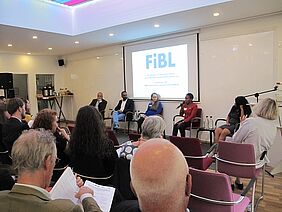On 19 September, over 40 people came together in Berlin for the FiBL-led event "Agroecology and Organic Farming and the Contribution to Global Food Security". The event aimed to present results from scientific trials and to stimulate a political debate on the role of organic agriculture and agroecology in the international development policy frameworks of German-speaking countries.
Scientific evidence shows advantages of a system approach
After an introduction by the keynote speaker Dr. Anne Muriuki (Kenya Agriculture & Livestock Research Organization) on the challenges and transformations of the African food systems, FiBL researchers presented the results of their research on the performance of organic agriculture and agroecology in tropical and sub-tropical climate zones in terms of productivity, economic viability, environmental soundness and social inclusiveness. The audience included participants from the German Parliament and ministries, as well as civil society organizations.
FiBL research results show that organic farming and agroecology can be successfully implemented in the tropics if practiced with holistic management. Thus, if management practices like intercropping or the preparation of high-quality fertilizer are adapted, farmers can equal or even obtain higher yields in organic agriculture compared to conventional or passive organic management. Hence, organic farming can represent an economic advantage for smallholders in addition to the well-known environmental benefits that this agricultural system brings. Research also showed that organic agriculture can improve soil fertility and biodiversity, as well as farmers' health and satisfaction. The yield potential in these regions is far from exhausted, as there is still too little knowledge on how to implement the concepts of organic farming and agroecology in a meaningful way.
Political actions are needed
The policy panel discussion included Marina Kosmus (GiZ), Lena Bassermann (TMG Research), Dr. Amritbir Riar (FiBL), and an open seat for the participants to raise their contribution.
The discussions centered around the role of research and policies in transforming food systems. During these conversations, the persistent narrative that organic agriculture cannot adequately feed the world was a topic of discussion. However, scientific evidence tends to reveal divergent trends depending on the diversity of farming systems and on-farm practices implemented. Meanwhile, there was a consensus on the importance of enhancing communication between policymakers and the scientific community, to inform and disseminate the latest evidence and coordinate the scaling-up of research findings.




